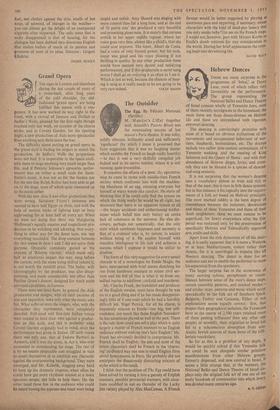Grand Opera
THE signs in London and elsewhere during the last couple of years of a come-back, after long years of the cold shoulder, for old- fashioned 'grand opera' are being fulfilled this season with a ven- geance. It has now worked its way right to the front, with a revival of Samson and Delilah at Sadler's Wells, planned for the first night though reached only last week, on account of the chorus strike, and at Covent Garden, for the opening flight, a new production of Aida more spectacular than anything seen there since the war.
The difficulty about putting on grand opera in the grand style is finding the singers to match the production. At Sadler's Wells the proportions were not bad. It is impossible in the space avail- able there to stage anything very much larger than life, and if Patricia Johnson's agreeable perfor- mance was on rather a small scale for Saint- Saens's music, it was not so for the theatre nor for the sets that Ralph Koltai had been able to get on to the stage, none of which quite measured up to the music either.
With the new Aida it was other proportions that were wrong. Salvatore Fiume's immense sets seemed to have half Egypt on them, and with the help of various tricks of lighting kept us buSy sight-seeing for at least half of every act. When we were not doing that there was Margherita Wallmann's equally massive and magnificent pro- duction to be watching and admiring. Not every- thing in either was for the finest taste, nor was everything successful. The drop curtains between the two scenes in Acts I and 2 did not serve their purpose. Dramatic continuity gained at the expense of *Roma vincitor,' which made only half its emotional impact this way, sung before the curtain, with the scene being shifted behind it; is not worth the musical price. The ballet, with choreography by the producer, was also disap- pointing, and made considerably less effect than Pauline Grant's dances, designed for much more cramped conditions, in Samson.
These were not fatal flaws. In general the Aida production and designs, with all their excesses of size and apparatus, were only what the music asks for. What suffered were the singers, who, with the characters they represented, were completely dwarfed. Full-sized and first-rate Italian voices were needed to hold their own against a produc- tion on this scale, and this is probably what Covent Garden originally had in mind, since the performance was given in Italian. Of such voices there was only one, that of Fedora Barbieri as Amneris, and it was she alone, in Act 4, who ever succeeded in commanding the stage. The rest of a by no means despicable cast struggled in vain to assert themselves or to establish any character against the overpowering background. They were swamped, and Mr. Kubelik, slogging away hard to keep up the dramatic impetus, when often he could have got more rhythmic tension at a more spacious tempo, did little to help them. On the other hand those few in the audience who could be heard booing the soprano and tenor were being stupid and unfair. Amy Shuard was singing with more control than for a long time, and at the end of '0 patria mia' she produced a very beautiful and promising piano note. It is mainly that curious stretch in her upper middle register, where her voice goes very thin, almost like a child's, that she could now improve. The tenor, Albert da Costa, had a voice of only limited power, but his tech- nique was good and his voice pleasing if not thrilling in quality. In any other production these would have seemed very decent and satisfying performances, and if this production is never sung worse I shall go on enjoying it as often as I see it. Which is just as well, because the chances of hear- ing it sung as it really needs to be are going to be
































 Previous page
Previous page